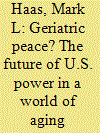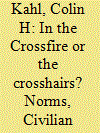|
|
|
Sort Order |
|
|
|
Items / Page
|
|
|
|
|
|
|
| Srl | Item |
| 1 |
ID:
080683


|
|
|
|
|
| Publication |
2008.
|
| Summary/Abstract |
Despite increasing attention, scholars lack the analytic tools necessary to understand international hierarchy and its consequences for politics and policy. This is especially true for the informal hierarchies now found in world affairs. Rooted in a formal-legal tradition, international relations scholars almost universally assume that the international system is a realm of anarchy. Although the fact of anarchy remains a truism for the system as a whole, it is a fallacy of division to infer that all relationships within that system are anarchic. Building on an alternative view of relational authority and recent research on the practice of sovereignty, a new conception of international hierarchy is developed that varies along two continua defined by security and economic relations. This construct is operationalized and validated, and then tested in a large-nstudy of the effects of international hierarchy on the defense effort of countries. The principal finding is that states in hierarchical relationships spend significantly less on defense relative to gross domestic product than states not in such relationships. In short, hierarchy matters and subordination pays; states appear to trade some portion of their sovereignty for protection from external security threats
|
|
|
|
|
|
|
|
|
|
|
|
|
|
|
|
| 2 |
ID:
080685


|
|
|
|
|
| Publication |
2007.
|
| Summary/Abstract |
In the coming decades, the most powerful states in the international system will face a challenge unlike any experienced in the history of great power politics: significant aging of their populations. Global aging will be a potent force for the continuation of U.S. economic and military dominance. Aging populations are likely to produce a slowdown in states' economic growth at the same time that governments will face substantial pressure to pay for massive new expenditures for elderly care. This economic dilemma will create such an austere fiscal environment that the other great powers will lack the resources necessary to overtake the United States' huge power lead. Moreover, although the U.S. population is growing older, it is doing so to a lesser extent and less quickly than all of the other major actors in the system. Consequently, the economic and fiscal costs created by social aging-as well as their derivative effects on military spending-will be significantly lower for the United States than for potential competitors. Nevertheless, the United States will experience substantial new costs created by its own aging population. As a result, it will most likely be unable to maintain the scope of its current international position and will be less able to realize key international objectives, including preventing the proliferation of weapons of mass destruction, funding nation building, and engaging in military humanitarian interventions
|
|
|
|
|
|
|
|
|
|
|
|
|
|
|
|
| 3 |
ID:
080684


|
|
|
|
|
| Publication |
2007.
|
| Summary/Abstract |
Since public disclosure by the Democratic People's Republic of Korea (DPRK) of its uranium enrichment program in 2002 and the subsequent restarting of its plutonium reactor, policymakers and academics have expressed concern that the DPRK will one day export nuclear material or components. An examination of North Korea's involvement in nonnuclear criminal activities shows that the DPRK has established sophisticated transnational smuggling networks, some of which involve terrorist groups and others that have been able to distribute counterfeit currency and goods on U.S. territory. These networks provide North Korea with a significant amount of much-needed hard currency, but the DPRK regime's control over them has decreased over time. These developments suggest that North Korea has both the means and motivation for exporting nuclear material, and that concerns over nuclear export from the DPRK, authorized or not, are well founded. When placed in the context of the global nuclear black market, the North Korea case suggests that criminal networks are likely to play an increased role in future proliferation. In addition, it raises the concern that proliferation conducted through illicit networks will not always be well controlled by the supplier state. It is therefore imperative to track and curtail illicit networks not only because of the costs they impose, but also because of the deterrent value of countersmuggling efforts. New strategies that integrate law enforcement, counterproliferation, and nonproliferation tools are likely to have the greatest success in addressing the risks posed by illicit proliferation networks
|
|
|
|
|
|
|
|
|
|
|
|
|
|
|
|
| 4 |
ID:
080682


|
|
|
|
|
| Publication |
2007.
|
| Summary/Abstract |
The belief that U.S. forces regularly violate the norm of noncombatant immunity (i.e., the notion that civilians should not be targeted or disproportionately harmed during hostilities) has been widely held since the outset of the Iraq War. Yet the evidence suggests that the U.S. military has done a better job of respecting noncombatant immunity in Iraq than is commonly thought. It also suggests that compliance has improved over time as the military has adjusted its behavior in response to real and perceived violations of the norm. This behavior is best explained by the internalization of noncombatant immunity within the U.S. military's organizational culture, especially since the Vietnam War. Contemporary U.S. military culture is characterized by an "annihilation-restraint paradox": a commitment to the use of overwhelming but lawful force. The restraint portion of this paradox explains relatively high levels of U.S. adherence with the norm of noncombatant immunity in Iraq, while the tension between annihilation and restraint helps to account for instances of noncompliance and for why Iraqi civilian casualties from U.S. operations, although low by historical standards, have still probably been higher than was militarily necessary or inevitable.
|
|
|
|
|
|
|
|
|
|
|
|
|
|
|
|
| 5 |
ID:
080686


|
|
|
|
|
| Publication |
2007.
|
| Summary/Abstract |
Since the Asian financial crisis of 1998, regional scholars and diplomats have maintained that the Association of Southeast Asian Nations (ASEAN) represents an evolving economic and security community. In addition, many contend that what is known as the ASEAN process not only has transformed Southeast Asia's international relations, but has started to build a shared East Asian regional identity. ASEAN's deeper integration into a security, economic, and political community, as well as its extension into the ASEAN Plus Three processes that were begun after the 1997 financial crisis, offers a test case of the dominant assumptions in both ASEAN scholarship and liberal and idealist accounts of international relations theory. Three case studies of ASEAN operating as an economic and security community demonstrate, however, that the norms and practices that ASEAN promotes, rather than creating an integrated community, can only sustain a pattern of limited intergovernmental and bureaucratically rigid interaction.
|
|
|
|
|
|
|
|
|
|
|
|
|
|
|
|
|
|
|
|
|